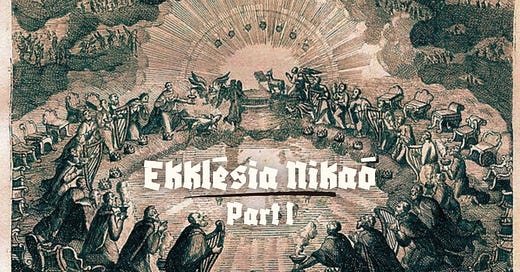Ekklēsia Nikaō, Part I: The Hidden in Plain Sight Message of Revelation
Why the Church Must Revive a Counter-Cultural Identity, or Die
At the end of your Bible, there’s a little work of literature that’s… not-so-little. One which has astounded, excited imagination, confused and embattled theologians, laypeople and critics over the millennia. Jefferson went so far as to express his spicy opinion that John’s Apocalypse was “merely the ravings of a maniac.”1
Dragons? Undead lambs with seven eyes and seven horns? Lion-locusts with scorpion tails?
What in the name of the Sci-Fi Channel is going on here?
Let’s talk for a minute about the book of Revelation.
Two of the most salient qualities in the art of being human are the ability to endure and, more difficult, the ability to overcome.
The Biblical authors express an awe-inspiring degree of solidarity in their view of what “overcoming” looks like: covenant faithfulness.
Wait — no swords, arrows, bombs — no violence?
Ding-ding. Correct.
Jesus once told His disciples “I am sending you out like sheep among wolves.”2 In many ways, Christ-followers (especially in the West) are being sent out into ideologically hostile territory. The whole world is corrupt, brutal and hates the Truth. The good news: Jesus is depicted as the Lamb Who conquered and overcame the whole world.3
John’s vision on Patmos reinforces this imagery, cranked up to volume 11.
Flip to Revelation chapter 5. Beyond sight, beyond sound, beyond comprehension, beyond language — John is tasked with detailing the scene. Before him is the divine assembly of the Most High God’s throne room: vast, majestic, melodious, terrifying and beautiful to the point of tears.
5 and one of the elders said to me, “Stop weeping; behold, the Lion that is from the tribe of Judah, the Root of David, has overcome so as to open the book and its seven seals.”
6 And I saw between the throne (with the four living creatures) and the elders a Lamb standing, as if slain, having seven horns and seven eyes, which are the seven Spirits of God, sent out into all the earth. 7 And He came and took the book out of the right hand of Him who sat on the throne. 8 When He had taken the book, the four living creatures and the twenty-four elders fell down before the Lamb, each one holding a harp and golden bowls full of incense, which are the prayers of the saints. 9 And they sang a new song, saying,
“Worthy are You to take the book and to break its seals; for You were slain, and purchased for God with Your blood men from every tribe and tongue and people and nation.
10 “You have made them to be a kingdom and priests to our God; and they will reign upon the earth.”
— Revelation 5:5-10
Finally, in the center of the adoration, John spots Him: the Lamb who has overcome.
Pause. Rewind.
In chapters 2 and 3 of the Revelation, Jesus has a unique message for each of the seven churches in Asia Minor. Though the words of warning and approval differ with each, one thing remains consistent in the septenary memorandum: the urge to overcome.
“To him who overcomes.”
Without fail, over and over, like a linguistic Whac-A-Mole, there it is in Greek:
νικάω.
nikaō.
“overcome.”4
The prevailing characteristic of the People of God, the Church, in every age is their ability to identify with Christ and overcome — not through means of military or political power, but, like their Savior, to be victorious through a life of self-denial and sacrifice. According to Michael J. Gorman:
But in Revelation the nature of power is being redefined. The power of the Lamb in Revelation takes two forms: the power of his death, the symbol of which is the slaughtered lamb, and the power of his spoken word, the symbol of which is the sword of his mouth… The Lamb’s power, his “conquering,” has been manifested, not in raw power associated with a lion, but in the power of faithfulness to death, a violent death that resulted in “ransoming,” or redeeming, a royal and priestly people for God.5
Faithfulness is the key here. Gorman continues: “Paradoxically, the slaughtered Lamb reveals God and also reveals what it means to be faithful to God. It reveals how God saves humanity and how humanity in turn can serve God.”6
Christ Himself described discipleship as taking up a cross daily to follow Him.7 Being faithful to Jesus starts here. Denying yourself, your comforts, your opinions, others’ opinions, your place in society, your money, your reputation. Denying the allure of the world and the value system of the culture we live in and the pervasive pull of the profoundly perverse obsession to “take the divine and reduce it to a commodity” (thanks, John Mark Comer) otherwise known as idolatry.8
ALL OF IT.
Throw out all you thought you knew, and learn from the Master.
THAT is how you nikaō. Overcome hardship. Greed. Anger. Overcome persecution. Overcome temptation. Overcome spiritual apathy. Pride.
Man. You feel that?
I mean, this is a supremely provocative, counter-cultural way of living we’re talking about here. Ultimately, though, as the Ekklēsia (the assembly embodying Christ’s governing authority on earth, the Church), it’s our identity. Hopefully, it’s yours.
Because without it, we’re not the Church anymore. We’re nothing. We die. And that ain’t good.
Jesus, the Lamb, has overcome.
Which means you can overcome, too.
In their excellent book Faith for Exiles, David Kinnaman and Mark Matlock share an ecclesiological goal which, in recent years as a pastor of high school students, has become mine: “to develop Jesus followers who are resiliently faithful in the face of cultural coercion and who live a vibrant life in the Spirit.”9
If there’s ever been a time necessitating that kind of sacred missiology, it sure feels like now. Kinnaman and Matlock detail five practices for developing a resilient faith that overcomes:
To form a resilient identity, you must experience intimacy with Jesus.
In a complex and anxious age, start to develop the muscles of cultural discernment.
When isolation and mistrust are the norms, forge meaningful, intergenerational relationships.
To ground and motivate an ambitious generation, train for vocational discipleship.
Curb entitlement and self-centered tendencies by engaging in countercultural mission.
As a next gen pastor, let me tell you: that. will. preach.
In this series, we’ll stroll down some ideological boulevards that include where the Church has been and where she’s headed; a journey in how to develop a resilient, covenant-faithful, unwavering allegiance to Christ in an unsympathetic age. The Church is the Bride of Christ, and as such is both victorious now and yet on her way to a glorious, culminating victory. This is an invitation to explore what it means for us to be ‘Ekklēsia Nikaō’ — the Church that overcomes.
Theodore Roosevelt once said: “The boy who is going to make a great man must not make up his mind merely to overcome a thousand obstacles, but to win in spite of a thousand repulses and defeats.”10
Christians, we need this tenacious attitude. Despite the seemingly esoteric symbolism and mythic storytelling, the message of Revelation is quite clear:
Be fiercely faithful to Jesus in how you live, and you will overcome with Him.
The Church has always thrived and multiplied under pressure from the sociopolitical powers. It’s when we’re at our very best. We’re forced to stay on mission — a countercultural mission that espouses the unique values of God’s Kingdom over the self-centered prerogatives of the fallen world — and make disciples as Christ instructed.
When the heat is on, the Church expands.
In his Dialogue with Trypho, Justin Martyr (himself beheaded by the state for the Gospel of Jesus) made an otherworldly assertion: “The more we are persecuted and martyred, the more do others in ever increasing numbers become believers.”11
Friends, that’s our calling. Like a slow, ascending trumpet it blows deep and galvanizing, stretching over the grey plains of apathetic monotony, beckoning us to run to the front lines of a cosmic battle; a war-cry to catalyze and unify an Eternal Bride away from the seduction of the zeitgeist to her place as a faithful witness of her Savior; a summons for the Church to engage the battalions of the dark kingdom through…
…self-sacrifice.
To die daily. Be the faithful servant. Count the cost. And we only do these things because of the Lamb.
“And they overcame him because of the blood of the Lamb and because of the word of their testimony, and they did not love their life even when faced with death.”
— Revelation 12:11
As a disciple of Jesus, there will be a lot for you to overcome. From outside, sure, but mostly from within yourself. You will have to lay down certain things the Holy Spirit directs you to part with. Some things you’ll be asked to pick up. There will be persecution.12 You may be ostracized. You could lose a job for your commitment to Jesus and living life His Way.
It doesn’t matter.
Your job as an apprentice to Jesus is to stay the course. God is the One Who opens doors and closes them for His faithful ones. It may feel heavy, but you can carry it… because He is carrying you. You can overcome. We, as the Church, must overcome together.
Jefferson, Thomas (1854). H.A. Washington (ed.). The Writings of Thomas Jefferson: Being His Autobiography, Correspondence. Washington, DC: Taylor & Marjory. p. 395.
Matthew 10:16
Revelation 5:5-6
G3528 - nikaō - Strong’s Greek Lexicon (kjv). (n.d.). Blue Letter Bible. https://www.blueletterbible.org/lexicon/g3528/kjv/tr/0-1/
Gorman, M. J. (2011). Reading Revelation responsibly: Uncivil Worship and Witness: Following the Lamb Into the New Creation. Cascade Books. p. 109.
Gorman, M. J. (2011). Reading Revelation responsibly: Uncivil Worship and Witness: Following the Lamb Into the New Creation. Cascade Books. p. 112.
Luke 9:23
Comer, J. M. (2015). Garden City: Work, Rest, and the Art of Being Human. Thomas Nelson. p. 217.
Kinnaman, D., Matlock, M., & Hawkins, A. (2019). Faith for exiles: 5 Ways for a New Generation to Follow Jesus in Digital Babylon. Baker Books. p. 30.
Theodore Roosevelt (2015). “Theodore Roosevelt on Bravery: Lessons from the Most Courageous Leader of the Twentieth Century”, p.13, Skyhorse Publishing, Inc.
Justin, S. (1846). Justin Martyr’s Dialogue with Trypho the Jew.
Persecution comes in many forms along a spectrum of cultural dynamics, from personal animosity and harassment to social censorship to physical imprisonment or violence. I am not suggesting (nor hoping) anyone should experience the worst of these, but merely taking cues from the Scriptures. Indigenous believers in every society will see persecution play out in distinctive ways.















I love this series and will be looking forward to the next one.
God bless you for sharing. 🙌
Looking forward to hearing your thoughts about the things the next generation (all believers, really) needs step into being the church.
I've been leaning into very similar goals for teen ministry.